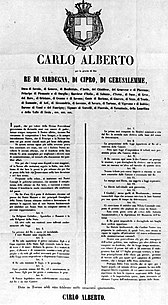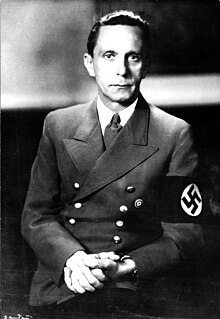User:Gracemavko/Freedom of the press
Article Draft[edit]
Areas to improve within the article:
- There should be a subcategory to explore the relationship of freedom of the press and a system of democracy. Put it right before the undemocratic states heading.
- Minor grammar and punctuation edits are needed to Relationship to Self Publishing
- An excessive amount of white space effects the visual approachability of the page, especially in the History subheading. Adding images would improve this article drastically.
* (copied text from Freedom of the press) and minor edits made within sections Relationship to self-publishing, Italy and Nazi Germany.*
Democratic states[edit]
A free and independent press has been theorized to be a key mechanism of a functioning, healthy democracy.[1] In the absence of censorship, journalism exists as a watchdog of private and government action, providing information to maintain an informed citizenry of voters.[1] In this perspective, "government efforts to influence published or broadcasted news content, either via media control or by inducing self-censorship, represent a threat to the access of important and necessary information to the public and affect the quality of democracy".[2] An independent press "serves to increase political knowledge, participation and voter turnout"[1], acting as an essential driver of civic participation.
References[edit]
- ^ a b c Ambrey, Christopher L.; Fleming, Christopher M.; Manning, Matthew; Smith, Christine (2015-08-04). "On the Confluence of Freedom of the Press, Control of Corruption and Societal Welfare". Social Indicators Research. 128 (2): 859–880. doi:10.1007/s11205-015-1060-0. ISSN 0303-8300.
- ^ Solis, Jonathan A.; Antenangeli, Leonardo (09/17). "Corruption Is Bad News for a Free Press: Reassessing the Relationship Between Media Freedom and Corruption: Corruption Is Bad News for a Free Press". Social Science Quarterly. 98 (3): 1112–1137. doi:10.1111/ssqu.12438.
{{cite journal}}: Check date values in:|date=(help)
Relationship to self-publishing[edit]
Freedom of the press is not construed as an absence of interference or outside entities, such as a government or religious organization, rather as a right for authors to have their works published by other people.[1] This idea was famously summarized by the 20th century American journalist, A. J. Why, who wrote, "Freedom of the press is guaranteed only to those who own one".[1] Freedom of the press gives the printer or publisher exclusive control over what the publisher chooses to publish, including the right to refuse to print anything for any reason.[1] If the author cannot reach a voluntary agreement with a publisher to produce the author's work, then the author must turn to self-publishing.
References[edit]
- ^ a b c Powe, L. A. Scot (1992). The Fourth Estate and the Constitution: Freedom of the Press in America. University of California Press. p. 200. ISBN 9780520913165.
Images to add to article[edit]
Italy[edit]

After the Italian unification in 1861, the Albertine Statute of 1848 was adopted as the constitution of the Kingdom of Italy. The Statute granted the freedom of the press with some restrictions in case of abuses and in religious matters, as stated in Article 28:[1]
The press shall be free, but the law may suppress abuses of this freedom. However, Bibles, catechisms, liturgical and prayer books shall not be printed without the prior permission of the Bishop.
After the abolition of the monarchy in 1946 and the abrogation of the Statute in 1948, the Constitution of the Republic of Italy guarantees the freedom of the press, as stated in Article 21, Paragraphs 2 and 3:[2]
The press may not be subjected to any authorisation or censorship. Seizure may be permitted only by judicial order stating the reason and only for offences expressly determined by the law on the press or in case of violation of the obligation to identify the persons responsible for such offences.
The Constitution allows the warrantless confiscation of periodicals in cases of absolute urgency, when the Judiciary cannot timely intervene, on the condition that a judicial validation must be obtained within 24 hours. Article 21 also gives restrictions against those publications considered offensive by public morality, as stated in Paragraph 6:
Publications, performances, and other exhibits offensive to public morality shall be prohibited. Measures of preventive and repressive measure against such violations shall be established by law.
- ^ "Lo Statuto Albertino" (PDF). The official website of the Presidency of the Italian Republic. Archived from the original (PDF) on 2018-08-16.
- ^ "The Italian Constitution" (PDF). The official website of the Presidency of the Italian Republic. Archived from the original on 2016-11-27.
Nazi Germany (1933–1945)[edit]

In 1933 freedom of the press was suppressed in Nazi Germany by the Reichstag Fire Decree of President Paul von Hindenburg, just as Adolf Hitler was coming to power. Hitler largely suppressed freedom of the press through Joseph Goebbels' Ministry of Public Enlightenment and Propaganda.[1] The Ministry acted as a central control point for all media, issuing orders as to what stories could be run and what stories would be suppressed. Anyone involved in the film industry - from directors to the lowliest assistant - had to sign an oath of loyalty to the Nazi Party, due to opinion-changing power Goebbels perceived movies to have. (Goebbels himself maintained some personal control over every single film made in Nazi Europe.) Journalists who crossed the Propaganda Ministry were routinely imprisoned.
- ^ Jonathon Green; Nicholas J. Karolides, eds. (2009). Encyclopedia of Censorship. Infobase Publishing. pp. 194–96. ISBN 9781438110011.
{{cite book}}:|author2=has generic name (help)
